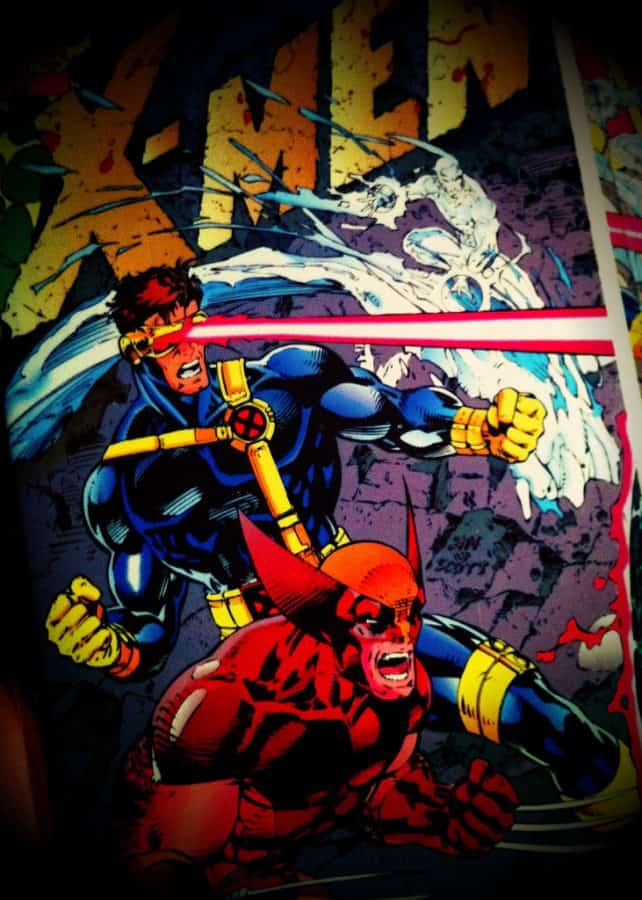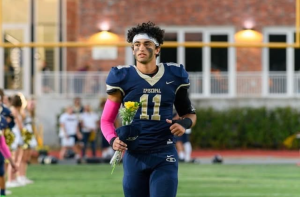Comic Review: Utopia and “Secret Wars” in Marvelous X-Men #1
February 20, 2019
Periodically, everything in comics changes. Reality gets rewritten, continuity erased.
In the 90s, the X-Men comics were all replaced with a set of new miniseries, taking place in a dystopian Marvel Universe where villain Apocalypse held control. In 2010, it was the “Age of X” event, wherein the X-Men were under siege (quite literally) in a world that hated and feared them even more than normal. Now, in 2019, it’s “Age of X-Man,” with another set of cancelled books and a new set of miniseries, ostensibly set in a utopia.
I won’t try to explain the concept of X-Man. He’s an alternate reality version of the alternate timeline son of Cyclops and Phoenix’s clone, but he’s not to be confused with the alternate timeline version of that alternate timeline son currently leading “X-Force” as Kid Cable. Look, the X-Men are complicated. Just take my word for it that he’s used his powers to reset the world to his liking.
In this universe, the “Age of X-Man,” individualism is the manifestation of Xavier’s Dream. Everyone is a mutant, and mutants are genetically engineered, born in test-tubes. Romance is forbidden, love erased, and X-team bonding is very much discouraged. Of course, takes only about 15 pages of Zac Thompson, Lonnie Nadler, Marco Failla, Matt Milla, and Joe Caramangna’s “Marvelous X-Men” #1 for our heroes to start to flash back to their old lives. X-23 (the cloned daughter of Wolverine who you might remember from the movie “Logan,”) begins to remember her sister, who seems nonexistent in this universe. Of course, Apocalypse makes a showing too, leading a rebellion against a world without love.
The issue isn’t bad in any sense of the word: the world is competently fleshed out, the story seems to be going somewhere, and Marco Filla’s art does a fine job of looking a tad more interesting than the sort of clean-lined cartoonieness of the current Marvel House Style. But I just can’t help but flashback to 2015’s “Secret Wars,” when Doctor Doom became a god of the Multiverse and created his own “utopian” reality on Battleworld, and where the memories of life in the “real” Marvel Universe began to seep into the heroes’ heads.
“Age of X-Man” is headed toward a big moment when the X-Men remember that they are more than just heroes, they are a family. Honestly, it will be a lot like when the Fantastic Four realized they were a family, and this was what would defeat Doom and end Battleworld once and for all. Of course, “Secret Wars” had hundreds of issues of build-up to this realization, “Age of X-Man” had 10.
These stories work because they give us versions of our heroes who seem to have lost what makes them heroic. Seeing them overcome whatever mental blocks keeps them from being themselves, feels good. We are reminded that the X-Men, at their core, are a family. That the Fantastic Four are, too. In all of these alternate reality stories, our heroes reveal what is true about them at their most basic level.
The best stories are those where the heroes win because of their most basic properties. Superman is at his best when his humanity, his heart, is what makes him super. Spider-Man seems like his responsibilities will outweigh his power, that he’ll fail the people he has sworn to protect, but then he lifts the rubble off his shoulders and proves that with great responsibility comes great power.
The X-Men are a family, maybe even a community. Their metaphor – the mutants who are born different and so are hated and feared – has always hovered around commentary on race, sexual identity or disability. They are a group that overcomes hatred and fear with the love they have for each other. So when they inevitably overcome the “Age of X-Man,” it will feel good to see, but it won’t be new.
That’s okay. Not every story in comics has to be new. This is at least the third alternate reality rewrite of the X-Men in the past 30 or so years, and it has happened far more times in the Marvel Universe at large. Unless “Age of X-Man” pulls a curveball and goes in a totally different direction, I can see this story going down the “Age of X” route: remembered well enough as a follow-up to the fan-favorite “Age of Apocalypse” but largely forgotten on its own merits. The utopia with a dark side has been done over and over again. This will be another notch in the TV Tropes article about the phenomenon, done competently, but not outstandingly.
It’s a little strange that in these days the X-Men aren’t front and center in the pages of Marvel Comics. It seems like this story, and lots of X-Men stories, have something to say about our current moment, about unity over division and coming together in a world full of hate and fear. I’m just not sure these X-Men are all-new or all-different enough to leave a lasting impression.










![NEWS | The University of Alabama issued guidelines for faculty that align with the passage of SB129, a controversial Alabama state law that, among other things, restricts DEI policies and prohibits endorsements of “divisive concepts.” These new guidelines highlight potential interactions with “divisive concepts” and formalize a new list of do’s and don’ts for classroom discussion and instruction.
From the start of the fall semester, SB129’s impact could be felt across campus, from the changes to funding for student organizations to the shuttering of the Safe Zone and offices of the Black Student Union. These outcomes were the result of SB129’s anti-DEI sections, preventing the University from sponsoring or promoting any DEI programs. The consequences of SB129’s “divisive concept” restrictions were more uncertain, however.
“[SB129] is vague, and what its implications will actually look like are not totally clear,” said Beth Ann Powers, an associate member in the University of Cincinnati Law Review.
Read the full story at the link in our bio.
📸 CW / Riley Thompson
🖊️ CW / Benjamin Smith
#theuniversityofalabama #universityofalabama #alabama #uofa #ua #crimsontide #tuscaloosa #tuscaloosaalabama #alabama #bama](https://thecrimsonwhite.com/wp-content/plugins/instagram-feed/img/placeholder.png)